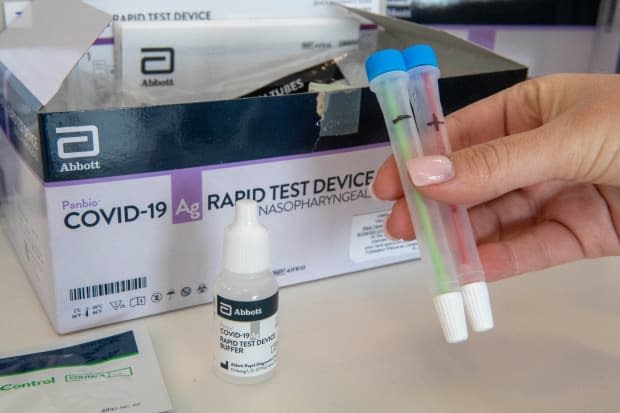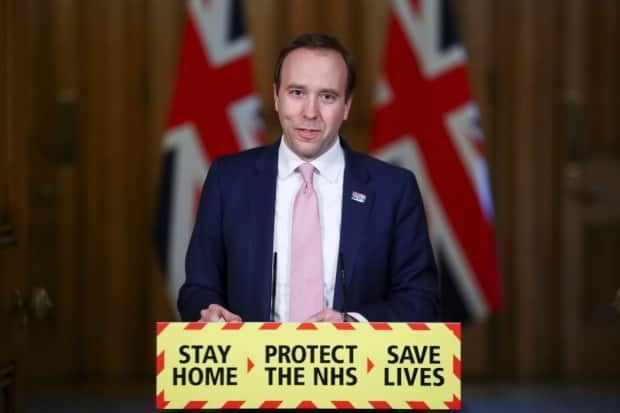Health Canada silent on COVID-19 home tests as other countries push forward

Prime Minister Justin Trudeau last week proudly announced a partnership with the Ontario government to provide more rapid COVID-19 tests for employees in key businesses, but it's still unclear at this time whether federal health officials believe there's a place for tests that can be obtained by all Canadians on pharmacy shelves and used at home.
Such home COVID-19 tests are part of the pandemic policy push in several countries — including Britain, Germany and the United States — as governments try to foresee what life will look like in a society where more people re-engage but not all are vaccinated.
"It's definitely not too late to do the right thing," said Dr. Kevin Schwartz, an infectious diseases physician at St. Joseph's Health Centre in Toronto who co-authored an article recently on the utility of easy-to-use rapid tests.
Advocates say there's a place for self-administered tests to screen for infection even as vaccinations progress. No single vaccine is 100 per cent effective, some people can't or won't get a vaccine and COVID-19 boosters could be needed as immunity wears off.
Schwartz said he believes there will still be a need for "public health measures that control the virus and allow us to open up safely" and stay open.
Putting accurate tests that can produce results in less than an hour into the hands of individuals who are not obviously symptomatic, the thinking goes, could be a crucial first-step screening tool to tamp down potential outbreaks and to reduce the year-plus burden on traditional labs in terms of resources, costs and wait times.

Both Britain and Germany are providing so-called lateral flow antigen tests for free on a quota basis, encouraging people to pick them up in a pharmacy, test at home and then report their results online or through an app.
"As lockdown restrictions ease, getting into the regular habit of testing twice a week will play an important role in keeping life moving," the National Health Service said in marketing material encouraging Britons to take the do-it-yourself approach.
Ontario pharmacists say home tests needed
Justin Bates, CEO of the Ontario Pharmacists Association, said pharmacies here should be able to handle that kind of initiative, having helped both directly administer as well as process rapid antigen tests for initiatives related to businesses and schools.
Bates said he is not aware of any impending Health Canada approval of home tests — which is not unusual, he says — but it would be a logical next step.
"That's where we need to be, if we really want to keep people safe and keep the economy open," he said. "We need to get these tests in the community in a way that is easy to use with not a lot of cost or barriers to using them."
Harvard epidemiologist Dr. Michael Mina, an advocate for home tests, has outlined scenarios where they could be of use, including when a person is deciding whether to attend an event where there are large crowds or a more intimate gathering where there will be vulnerable persons, or when a child comes home from school with symptoms that could portend COVID-19, influenza or the common cold.
Antigen tests look for viral proteins rather than genetic material that can linger, such as lab-processed polymerase chain reaction (PCR) tests. Because of that, Mina likened the home tests in an interview last year with CBC News as serving a "security guard" role rather than a "detective" function of diagnosing someone as having COVID-19 currently or in the recent past.
LISTEN | Dr. Michael Mina speaks to Quirks & Quarks about rapid tests (Nov. 2020):
If a person gets a positive result on a home test, they're advised to seek out a confirmatory PCR result through official channels.
The offerings in U.S. pharmacies are not free and include lateral flow tests from domestic manufacturer Abbott and Australian company Ellume, as well as a so-called molecular test from U.S.-based Lucira. The first two cost about $20 to $25 US for a pack of two tests, while the latter is about twice as expensive.
U.S. company received authorization 'with conditions'
Lucira noted in a news release in late April that it had received "authorization with conditions" for its product in this country, but Health Canada never commented on the approval at the time.
Lucira said its tests should be available for Canadians to order online by June for about $75, excluding taxes and delivery charges. At that price point and online distribution model, they are not expected to be a mass-population solution.

When CBC News reached out to Health Canada with questions about both the Lucira approval and how close to a decision the department was on antigen home tests that have been put forth for consideration, they essentially went unanswered, with a generalized response to keep monitoring its website for future authorizations.
"Although molecular (PCR) laboratory testing is the gold standard in diagnostic testing, numerous technologies and testing methods are emerging that could supplement diagnostic testing," the Health Canada site states.
Health Canada said last year it wouldn't consider at-home tests due to concerns about accuracy, though it later changed that stance.
With respect to accuracy, the British government last week trumpeted an independent study indicating that one of the home tests it approved had a 100 per cent rate of specificity compared with PCR lab tests and a 96.4 per cent rate with respect to sensitivity.
Specificity refers to a test's ability to correctly identify those who are not viral, while sensitivity refers to the ability to detect those who are COVID-19 positive.
To Schwartz of St. Joseph's Health Centre, the rhetoric surrounding rapid home tests has too often been focused on the occasional false negative results that will ultimately occur at the "individual level," instead of looking at "population level" mitigation.

"The goal is not to pick up every infectious person, it's to pick up enough people with a high enough viral load to reduce the infection rate enough that you're going to control it on a population level," he said. "If we start thinking about it that way, these tests make a lot of sense for implementation."
To keep home tests off the market for not being quite as accurate as PCR tests, Schwartz said, is to choose not to screen much at all.
Home tests not mentioned by Trudeau
Even a home-test backer like Mina admitted in a recent podcast that he's not sure people will want to get into the habit of testing themselves on a regular basis. In Britain, the government has taken out ads in newspapers to explain the tests and encourage usage.
One writer, from MIT Technology Review, expressed worries about user error creating false positives that, if amplified by stories in the media, could discourage their widespread use.
WATCH | Advocates tout rapid tests, but deployment has been uneven:
Finally, it's also true that Canada has struggled to deploy the full allocation of rapid tests even for use in workplaces and schools.
But it appears it will be several months before most Canadian teens and adolescents will be vaccinated, and it's not clear when kids under 12 could follow.
As more parents are coaxed back to in-person work settings, having an option to administer a test at home could be welcomed over the possibility of enduring testing lineups, traditional lab wait times and two-week pullouts of their children from school in the wake of a single confirmed COVID-19 case in a given classroom.
On Wednesday, Trudeau made generalized references to "screening" as being necessary for Canada to get out of its current COVID-19 predicament and prevent future waves, but once again, home tests were not part of the discussion.

 Yahoo Movies
Yahoo Movies 